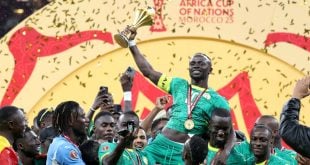CameroonOnline.ORG | On the last day of July 2025, the Cameroonian singer Ulanda, known fondly as “Mama Makossa,” experienced a deeply painful return to the country of her birth. After stepping off her flight at Douala International Airport, she was stopped by immigration officials, who declared her documents non-compliant and placed her on the next flight to Kigali.
Although Ulanda is Cameroonian by birth, she also holds American citizenship. The problem arose when her Cameroonian visa expired and her attempt to renew it in Yaoundé failed because of a system breakdown. She was instructed to use the new online renewal platform, which she did, paying the required fees. But upon arrival, the renewal was not validated in the system. Even when she presented her receipt of payment, officials looked past it and focused instead on the fact that she was traveling with her American passport. Within hours, she was on board a RwandAir flight against her will.
For an artist who has carried her homeland in her music, the moment was heartbreaking.
Ulanda has never stopped celebrating Cameroon through her art, her entrepreneurial ventures, and her collaborations. She recently opened an African restaurant in Limbé, her hometown, and she continues to honor the legacy of Cameroonian music by working with artists such as Coco Argentée and by covering songs from legends like Anne-Marie Nzié. Just before the incident, she had released “Validé,” a single in collaboration with Coco Argentée, a gesture of cultural pride and continuity.
After spending two days in Kigali, she eventually secured a new visa, and her team confirmed that she would return to Cameroon. But the emotional wound of being turned away was not so easily healed. From South Africa, where she was temporarily staying, she shared her feelings in a heartfelt message on social media. In it, she described the deep frustration of being denied entry into the very land she calls home, questioning how one can truly feel Cameroonian when entry into the country is blocked by a technical error.
Her words carried more than personal pain. They carried a plea for change. Ulanda urged Cameroon to reconsider its rigid stance on dual nationality. She argued that the diaspora, far from being outsiders, are among the most devoted contributors to the country’s cultural and economic life. For her, and for many others, the lack of legal recognition for dual nationality creates unnecessary barriers to a genuine connection with home.
Ulanda’s story is a personal one, but it resonates widely with those who straddle more than one identity. It is a reminder that love for a homeland is not erased by distance or by foreign passports, and that nations must learn to embrace their children—wherever they may live and whatever citizenship papers they may carry.
 CameroonOnline.org Cameroon news, Actualité Camerounaise, live Web TV & Radio, World News and a lot more
CameroonOnline.org Cameroon news, Actualité Camerounaise, live Web TV & Radio, World News and a lot more

I am not a fan of the Cameroon government. However, there is no diplomatic agreement between the US and Cameroon for dual-citizenship. It doesn’t matter whether one is a millionaire, an investor, or singer. From a diplomatic perspective, it is the law. How did she manage to get a visa in Kigali? Did she surrender her Cameroonian passport to the embassy? That is not known. However, with Cameroon, everything but the right thing is possible. Advocacy doesn’t mean knowingly breaking the law. And the US DOS does not advise US citizen to break the law. For more information on this issue, refer to:
(U.S. Dept of State — Bureau of Consular Affairs 12/18/2024:Available at: https://travel.state.gov/content/travel/en/international-travel/International-Travel-Country-Information-Pages/Cameroon.html).
I understand that, officially, Cameroon does not recognize dual citizenship. However, in practice, many individuals do hold it. For example, athletes who represent Cameroon in international sports, such as members of the national football or basketball teams, often have dual citizenship. To my knowledge, Francis Ngannou also holds dual citizenship, and I am unsure whether he is ever required to obtain a visa when traveling to Cameroon. Even within the government, there are members who benefit from dual citizenship.
This highlights the issue: as is often the case in Cameroon, laws seem to apply to ordinary citizens but not to the privileged. Consequently, countless Cameroonians in the diaspora, myself included, would be far less willing to invest back home.
I agree with you, here the problem is that agent who denied her entree but not the law
It’s purely an issue of national interest Cameron is correct here .That is their law crafted for their protection and wellbeing.